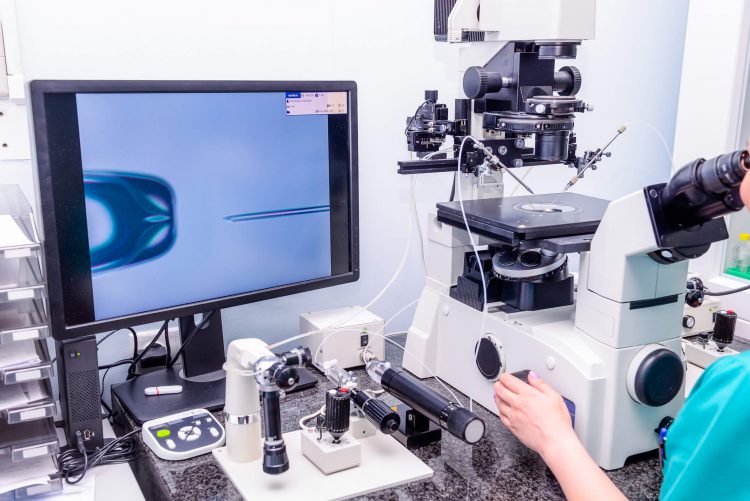Written by: Dr. Amy Kohlmeier, a board eligible reproductive endocrinology and infertility specialist at CCRM Fertility of Minneapolis
The fertility world is full of acronyms, and you may have heard of ICSI, pronounced “ick-see.” It stands for intracytoplasmic sperm injection. You might not know exactly what it entails or why you would need to have it done.
ICSI is used in many circumstances where sperm may have difficulty getting through an egg in order for fertilization to occur. Oftentimes, it’s standard in many in vitro fertilization (IVF) cycles.
Here is an overview of ICSI and when it’s used. But as with other fertility treatments, make sure you talk with your doctor about your specific treatment plan.
What is ICSI?
ICSI is a procedure where a single live sperm is injected into the center of the egg using a needle and guided by microscope. You can only have this process done after going through an egg retrieval for IVF.
A semen sample starts out washed and prepared to get the healthiest sperm separated from the seminal fluid and any contaminants. The embryologist, a medical professional who is in charge of caring for your embryos, carefully draws up a single sperm with a needle and injects it directly into the egg. It’s a step closer to creating a healthy embryo and increases your chances of pregnancy.
Why is ICSI used?
In conventional IVF, washed sperm are essentially “dumped” into a petri-dish with eggs and it’s on to the races over which sperm makes it first into the egg. However, advances in fertility treatments such as using ICSI can greatly increase the chances of successful fertilization.
In many clinics, ICSI has become a standard during IVF cycles. Because ICSI is a relatively safe procedure, doctors often perform it in order to give patients the best chances for a live birth. However, there are specific instances where ICSI is recommended.
- Abnormal sperm parameters: This could be any concern over sperm such as the structure, genetic makeup, how they swim, or are shaped. In non-ejaculated sperm, or sperm that have to be surgically removed from the body, ICSI is also necessary.
- Unexplained infertility: In instances where there is no known cause of infertility, ISCI is often done as it’s possible there’s a sperm fertilization concern unidentified with semen analysis. It’s also done when there’s been prior failed insemination attempts.
- Poor egg quality: There isn’t a lot of research out there on the benefits of ICSI for egg quality issues. But oftentimes, poor egg quality goes hand-in-hand with a woman’s age. With ICSI, your doctor can maximize the number of eggs that fertilize despite the chances of lower quality.
- Genetic testing: When embryos will be genetically tested (known as preimplantation genetic testing), there’s a higher risk of contamination from sperm trying to fertilize an egg during conventional insemination. Therefore, ICSI is usually performed to get accurate results.
- Frozen eggs: The thawing process can damage the outer shell of the egg, so ICSI is necessary in these cases.
What are the risks associated with ICSI?
You might think that injecting sperm into an egg could cause potential damage to the egg. While there’s a small chance of this happening, the risks of an egg not fertilizing with ICSI can be due to the underlying fertility issues rather than the process itself.
There’s some research stating an increased risk of birth defects with ICSI. Again, this may have more to do with the underlying reason why a person or couple needed fertility treatments in the first place.
It’s important to advocate for yourself and have the answers you need before moving forward with ICSI. Talk with one of our CCRM Fertility specialists if you’re planning an IVF cycle with ICSI. We’re here to answer your questions to make a choice right for you.


